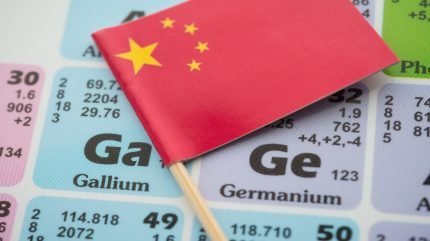President Trump on Monday said a 15% tariff on imports from South Korea will hold despite President Lee Jae Myung’s visit to Washington, D.C.
“We stuck to our guns,” the president said after the meeting.
The two countries struck a trade deal in July, allowing South Korea to avoid a stiffer 25% tariff, but tensions over the agreement have persisted, Bloomberg reports.
Last week, Trump said that the US is investigating furniture imports and will impose a tariff on the products once the probe is complete.
“Furniture coming from other Countries into the United States will be Tariffed at a Rate yet to be determined,” the president wrote on Truth Social. He added the effort would “bring the Furniture Business back to North Carolina, South Carolina, Michigan, and States all across the Union.”
Furniture stocks including Williams Sonoma (WSM) and Wayfair (W) tumbled on Monday in the first immediate reaction to Trump’s comments.
Meanwhile, US tariffs on imports from India are set to double on Wednesday, with no indications that the countries are moving toward any kind of deal.
Late last week, White House trade adviser Peter Navarro again criticized India for its ongoing purchases of Russian oil and said he anticipates the planned 50% punitive tariffs on Indian imports will take effect next week.
“I see that taking place,” Navarro told reporters. “India doesn’t appear to want to recognize its role in the bloodshed. It simply doesn’t. It’s cozying up to Xi Jinping, is what it’s doing.”
Also last week, Canada vowed to drop its retaliatory tariffs to match US tariff exemptions for goods covered under the US-Mexico-Canada trade pact. And the US and the EU established a written framework for the trade deal agreed to in late July. The terms include a 15% US tariff on most EU imports, including autos, pharmaceutical goods, semiconductors, and lumber — but not wine and spirits.
Earlier this month, Trump unveiled “reciprocal” tariffs on dozens of US trade partners (which you can see in the graphic below).
Those tariffs face legal limbo in an appeals court case that could be decided within days.
Justice Department lawyers and lawyers for a group of small business importers who are challenging the tariffs imposed under this authority argued their positions before the US Court of Appeals for the Federal Circuit. If the court rules against the government, it’s likely Trump would appeal to the Supreme Court.
Read more: What Trump’s tariffs mean for the economy and your wallet
Here are the latest updates as the policy reverberates around the world.
LIVE 1738 updates
-
South Korea to continue to face 15% tariff despite president’s Washington visit
President Trump said South Korea will continue to face a 15% tariff on imports, despite President Lee Jae Myung’s visit to Washington on Monday. The two countries struck a trade deal establishing the tariff rate in July.
Bloomberg reports:
-
Trump says he will impose 200% tariffs on China if the country withholds magnets
President Trump suggested on Monday he could slap a 200% tariff on Chinese goods if China doesn’t sell magnets to the US.
“They have to give us magnets,” Trump said at the Oval Office after meeting with South Korean President Lee Jae Myung.
“If they don’t give us magnets, then we have to charge them 200% tariff or something,” he continued. “But we’re not going to have a problem, I dont think, with that.”
Trump’s comments come after China tightened its control of rare earth mining and production. The Ministry of Industry and Information Technology announced Chinese mining firms would be subject to strict quota limits and be required to keep track of product flows. China currently refines about 99% of the world’s supply of heavy rare earth minerals.
“It’ll take us probably about a year to have them,” Trump said, referring to a US supply of magnets.
-
Trump suggests South Korea tariffs will stay at 15%
President Trump on Monday suggested tariffs on imports from South Korea would stay at 15% despite the country’s push to secure better terms.
-
Canadians load up on US stocks despite Trump’s trade war
US President Donald Trump’s tariffs, threats of annexation and assorted insults have infuriated Canadians, leading them to sell off American real estate and boycott products.
The nation’s investors seemingly never got the memo, Bloomberg reports:
-
Furniture stocks were under pressure Monday after President Trump opened an investigation into imports of furniture, which is expected to lead to new tariffs.
Wayfair (W) shares fell 9%, while RH (RH) lost 7%, Sleep Number (SNBR) dropped 5%, and The Lovesac Company (LOVE) declined about 4% not long after the opening bell.
“Within the next 50 days, that Investigation will be completed, and Furniture coming from other Countries into the United States will be Tariffed at a Rate yet to be determined,” Trump wrote in a Truth Social post on Friday.
However, not all furniture stocks took a leg lower. Ethan Allen (ETD) and La-Z-Boy (LZB) stocks nudged slightly higher, as the two furniture companies produce a significant portion of their items in the US.
-
US farmers face double whammy of trade war and bumper crops
US farmers are feeling the heat from President Trump’s tariffs and it wouldn’t be the first time they have been pressured by Trump’s policies.
As Washington and Beijing continue trade negotiations, China, one of the top buyers of soybeans, has significantly reduced its purchases from the US. As a result, crop prices are near multiyear lows, and big harvests ahead could make the situation tougher.
Bloomberg News reports:
-
Trump says US to tariff furniture imports following investigation
President Trump said his administration is investigating furniture imports and will complete the probe in the next 50 days.
“Furniture coming from other Countries into the United States will be Tariffed at a Rate yet to be determined,” the president wrote on Truth Social. He added the effort would “bring the Furniture Business back to North Carolina, South Carolina, Michigan, and States all across the Union.”
-
Canada will match US exemptions to punishing tariffs
TORONTO (AP) — Canada is dropping retaliatory tariffs to match U.S. tariff exemptions for goods covered under the United States-Mexico-Canada trade pact, a government official familiar with the matter said Friday.
-
Powell: Tariff price effects are ‘now clearly visible’
Federal Reserve Chair Jerome Powell noted that inflation risks remain “tilted to the upside” in his speech at the Jackson Hole symposium on Friday, and the effects of President Trump’s trade policy remain a key factor in the central bank’s decision making.
“The effects of tariffs on consumer prices are now clearly visible,” Powell stated. “We expect those effects to accumulate over coming months, with high uncertainty about timing and amounts.”
Powell laid out several scenarios for the path of tariff-related inflation.
“A reasonable base case is that the effects will be relatively short lived — a one-time shift in the price level,” he said. “It is also possible, however, that the upward pressure on prices from tariffs could spur a more lasting inflation dynamic, and that is a risk to be assessed and managed.”
In either case, Powell reaffirmed that the Fed remains focused on preventing inflation from becoming entrenched.
“Come what may, we will not allow a one-time increase in the price level to become an ongoing inflation problem,” he said.
-
Postal services to stop sending low-cost parcels to US as duty exemption ends
Global postal services are going to stop parcel deliveries to the US ahead of President Trump’s deadline to end a tax exemption that allowed businesses to avoid import tariffs on small packages.
Countries such as Sweden and Norway have already made the move to stop sending low-cost packages to the US.
The FT reports:
-
China’s imports of US rare earth ore surge in July
China’s imports of rare earth ore from the US jumped sharply in July, likely reflecting the final shipments from US supplier MP Materials (MP).
Reuters reports:
-
Navarro slams India again over Russian oil as 50% tariffs loom
White House trade adviser Peter Navarro has blasted India again for continuing to buy Russian oil and said he expects punitive tariffs of 50% on imports from the South Asian nation to kick in as planned next week.
Bloomberg News reports:
-
China ‘firmly stands’ with India on Trump tariffs
Bloomberg News reports:
-
Nvidia tells partners to halt work on H20 chip for China
Nvidia (NVDA) has told suppliers including Samsung (005930.KS) and Amkor (AMKR) to halt production of its H20 AI chip after Beijing urged firms to avoid the processor, according to a report in the Information. The move raises doubts over demand as Chinese buyers shift to Huawei and Cambricon (688256.SS).
The suspension adds pressure to US chipmakers and could complicate trade talks, with Nvidia CEO Jensen Huang saying any successor for China will hinge on US approval.
Bloomberg News reports:
-
Tariffs are giving parents back-to-school sticker shock
As the summer holidays come to an end and children head back to school, parents are getting a nasty surprise when they check price tags for kids clothing due to President Trump’s sweeping tariffs.
CNN reports:
-
US-EU trade deal impacts on pharma industry more ‘manageable’ than expected
Yahoo Finance’s Anjalee Khemlani reports:
-
J&J to invest $2B to boost US manufacturing as drug tariffs loom
-
Walmart CEO: Tariff impact has been ‘gradual,’ but we expect costs to increase
Walmart (WMT) reassured investors that it’s continuing to gain market share and generate healthy sales growth.
But even though executives said the company didn’t see any “dramatic shifts” with consumer behavior last quarter, they did communicate that keeping costs low could become a greater challenge in the second half of the year as tariff-related price increases work their way through inventory.
“With regards to our US pricing decisions, given tariff-related cost pressures, we’re doing what we said we would do: We’re keeping our prices as low as we can for as long as we can,” Walmart CEO Doug McMillon said on Walmart’s earnings call.
“The way things have played out so far, the impact of tariffs has been gradual enough that any behavioral adjustments by the customer have been somewhat muted,” McMillon continued. “But as we replenish inventory at post-tariff price levels, we’ve continued to see our costs increase each week, which we expect will continue into the third and fourth quarters.”
-
Economic impact of US tariffs will be key for US rating
(Reuters) – S&P Global Ratings’ decision to affirm its U.S. credit rating reflected the impact of tariff revenues, but questions remain on the economic outcome of U.S. trade policies that could influence the country’s rating in the next few years, the primary analyst on the U.S. said.
S&P on Monday affirmed its “AA+” credit rating on the U.S., saying the revenue from President Donald Trump’s tariffs has the potential to offset the fiscal hit from his massive tax-cut and spending bill. S&P, which became the first ratings agency to cut the pristine U.S. government rating in 2011, said the outlook on the U.S. rating remains stable.
“Outcomes are what’s really going to weigh and inform the rating,” Lisa Schineller, primary U.S. analyst at S&P Global Ratings, said in an interview.
“The outcomes of how you execute the budgetary legislation, how the tariff revenue comes, their combined impact on growth and investment that leads to either better or worse or similar fiscal out-turns, that’s our focus,” she said.
-

EU-US trade deal does not include wine and spirits
BRUSSELS (Reuters) – The EU-U.S. trade deal does not include wine and spirits, European Union Trade Commissioner Maros Sefcovic said on Thursday, adding that the door was not closed to tariff reductions for the sector and others not included in the deal. …
“This one we didn’t get in. But I can tell you that there is clear commitment from the European Commission to put it on the table”, Sefcovic said, referring to wines and spirits.




![[News] TSMC Reportedly Eliminates Chinese Equipment Use in 2nm Production as U.S. Rules Loom](https://koala-by.com/wp-content/uploads/2025/08/TSMC-WAFER-NO6-624x416.jpg)




